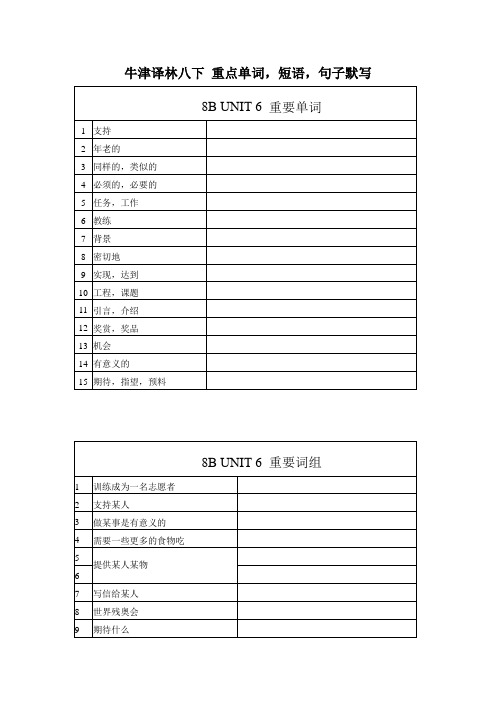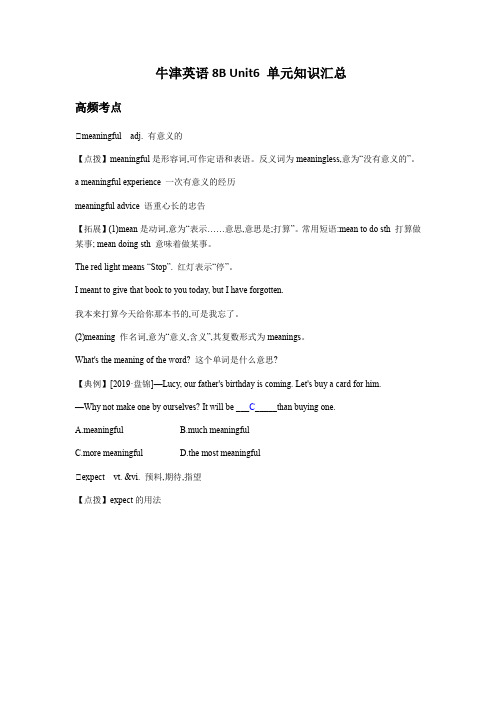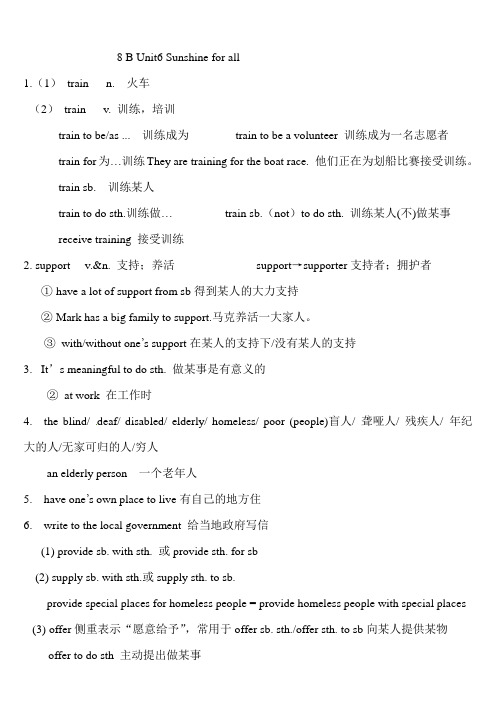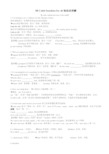8B Unit6 Sunshine for all知识点归纳与练习
牛津译林版英语八年级下Unit 6 Sunshine for all单词,短语,句子默写(含答案)

1
用这种方式,他们能够帮组当地人改善生活。
In this way, they can help the local people improve their lives.
2
自从上个月起,他就住院了。
He has been ill in hospital since last month.
25
取得第四名
26
感到更加自信
27
因为
28
齐聚一堂
29
来自不同背景
30
感觉像一个大家庭中的一员
31
亲密地工作
32
实现某人的梦想
33
34
35
没有得到报酬
36
赢得第一名
37
举办
38
做某事是有趣的
39
对做某事感兴趣
40
给老人让座
41
捐钱给慈善机构
42
赢得比赛
43
一对一地做某人的工作
44
没有某人的帮助
45
有一些经验
46
一个大学生
a college student
47
中国西南
south-west China
48
一个志愿者项目
a volunteer project
49
在某人的日常生活中
in one's daily lives
50
采取行动保护环境
take action to protect the environment
4
必须的,必要的
necessary
5
任务,工作
task
6
教练
coach
牛津英语8B Unit6 Sunshine for all 单元知识汇总

牛津英语8B Unit6 单元知识汇总高频考点❶meaningful adj. 有意义的【点拨】meaningful是形容词,可作定语和表语。
反义词为meaningless,意为“没有意义的”。
a meaningful experience 一次有意义的经历meaningful advice 语重心长的忠告【拓展】(1)mean是动词,意为“表示……意思,意思是;打算”。
常用短语:mean to do sth 打算做某事; mean doing sth 意味着做某事。
The red light means “Stop”. 红灯表示“停”。
I meant to give that book to you today, but I have forgotten.我本来打算今天给你那本书的,可是我忘了。
(2)meaning 作名词,意为“意义,含义”,其复数形式为meanings。
What's the meaning of the word? 这个单词是什么意思?【典例】[2019·盘锦]—Lucy, our father's birthday is coming. Let's buy a card for him.—Why not make one by ourselves? It will be ___C_____than buying one.A.meaningfulB.much meaningfulC.more meaningfulD.the most meaningful❶expect vt. &vi. 预料,期待,指望【点拨】expect的用法【拓展】expect的名词形式为expectation。
We should not expect success overnight.我们不应该期望一夜之间就取得成功。
I expect to pass the exam. 我期望通过考试。
牛津译林版英语八年级下册8b unit6 sunshine for all 知识点汇编

8 B Unit6 Sunshine for all1.(1)train n. 火车(2)train v. 训练,培训train to be/as ... 训练成为train to be a volunteer 训练成为一名志愿者train for为…训练They are training for the boat race. 他们正在为划船比赛接受训练。
train sb. 训练某人train to do sth.训练做…train sb.(not)to do sth. 训练某人(不)做某事receive training 接受训练2. support v.&n. 支持;养活support→supporter支持者;拥护者①have a lot of support from sb得到某人的大力支持②Mark has a big family to support.马克养活一大家人。
③with/without one’s support在某人的支持下/没有某人的支持3.It’s meaningful to do sth. 做某事是有意义的②at work 在工作时4. the blind/ deaf/ disabled/ elderly/ homeless/ poor (people)盲人/ 聋哑人/ 残疾人/ 年纪大的人/无家可归的人/穷人an elderly person 一个老年人5. have one’s own place to live有自己的地方住6. write to the local government 给当地政府写信(1) provide sb. with sth. 或provide sth. for sb(2) supply sb. with sth.或supply sth. to sb.provide special places for homeless people = provide homeless people with special places (3) offer侧重表示“愿意给予”,常用于offer sb. sth./offer sth. to sb向某人提供某物offer to do sth 主动提出做某事一份志愿者经历的报告7.(1) ① experience作“(一次)经历”解时,是可数名词;作“经验”解时,是不可数名词.表示做某事的经验,in [of] doingsth。
8B Unit6 Sunshine for all(Grammar+Task)辅导讲义牛津译林版

8B第六单元(Grammar+Task)辅导讲义【同步知识梳理】知识点1:It is helpful to donate money to charities. (P84)用法解析:donate vt.& vi.(尤指向慈善机构)捐赠; 献(血); 捐(血); 捐献(器官);n. donation 捐赠; 捐献;donate money to…向...捐钱=raise money for....例:I can donate one hundred dollars to people in need.These are donations from the youth.例题训练:He’s _________ a lot of __________ to Project Hope. (donate)答:donated,donations知识点2:Do you have any trouble talking to people with intellectual disabilities?(P85)用法解析:have trouble (in) doing sth. 做某事有麻烦=have problems\difficulty (in)doing sth例:Do you have trouble in learning English? 你在英语上有困难吗?have no trouble in doing sth 做某事没困难have some trouble in doing sth 在做……方面有困难例题训练:She has many maths problems _____(solve) and she has many problems _____ (work out) the maths problems.答:to solve,working out知识点3:South-west China(P87)用法解析:north,south,east,west;名词;副词northern,southern,eastern,western.形容词东南方:south-east 西南方:south-west西北方:north-west 东北方:north-east例:The Ming Tombs are located (坐落)about 50 km to the north-west of Beijing.Jiangsu is in the southern part of China.用法回顾:方位介词:in (to,on) the east of①A在B的范围之内时就用"A is in the east of B",例:Italy is in the south of Europe.②A在B的范围之外,且相隔有一定的距离,就用"A lies to the east of B".例:France lies (to the) east of England.③A与B相邻接。
Unit 6 Sunshine for all知识点梳理复习学案(含答案) 牛津译林版八年级英语下册

英语学科讲义【考点解析train】train意为“训练”,常构成短语train for,意为“为……而训练”,介词for表示目的,意为“为……”;其中train作不及物动词;train as意为“训练当……”。
【例句】He is training to be a doctor.He is now being trained as a volunteer.【拓展】train也可以作及物动词,后面直接跟宾语。
【例句】They are training the dolphin to help them save people in the sea.trainer n.教练员.驯兽师trainee n.接受培训者,学员,实习生【典型例题】学生们正为做志愿者而进行训练。
The students _______ _______ _______ _______ _______.【答案】are training for the volunteers2. It's meaningful to do something for the Olympics. 为奥林匹克运动会做一些事情是很有意义的。
【考点解析】meaningful形容词,意为“有意义的”,由名词meaning加形容词后缀-ful构成。
句型“It's+adj.+(for sb.)+to do sth.“结构。
【例句】It's meaningful to plant trees every year.每年植树很有意义。
【拓展】mean 动词,意为“意思是,意味着”meaning名词,意为“意义”,由动词mean加-ing构成meaningless,形容词,“无意义的”。
用单词的适当形式填空。
1.Swimming in the sea is a_______ (mean) experience.2.My parents think anything is ______ (mean) except learning.3.What’s the______ (mean) of the following word?4.What does the sign ______ (mean)?【答案】meaningful, meaningless, meaning, mean3. I need some more food to eat at work.我还需要更多食物在工作时吃。
(译林版)8B Unit6 Sunshine for all知识点详解

8B Unit6 Sunshine for all知识点详解【comic strip&welcome to the unit】1. I’m training to be a volunteer for the Olympic Games.我在训练成为一名奥林匹克运动会的志愿者。
→train此处用作动词,意为“培训,接受训练”。
train for sth.因某事而训练。
for 后表示目的。
她正在为快到的运动会做训练。
She is the coming sports meeting.train as sth作为(职业)接受训练。
as 后接职业名词。
他正在训练成为一名医生。
He is training a doctor.We should train students to form good habits. 我们应该训练学生养成好的习惯。
【拓展】①train还可用作可数名词,意为“火车”。
I’ll go there train. 我会坐火车去那儿。
②training是不可数名词,意为“训练”。
You need training. 你需要更多的训练。
go into training 开始训练。
2. Will you support me, Eddie? 你会支持我吗,艾迪?→support此处用作及物动词,意为“支持,支撑,鼓励”。
I don’t his opinion. 我不支持他的看法。
【拓展】①support还可用作不可数名词,意为“支持,拥护”。
He needs our . 他需要我们的支持。
②supporter 可数名词,意为“支持者,拥护者”。
He has many . 他有很多拥护者。
3. It’s meaningful to do something for the Olympics. 为奥运会做事情是很有意义的。
→meaningful 形容词,“有意义的”,其反义词为meaningless,“无意义的”,在句中可作表语或定语。
牛津译林版英语八年级下册期末复习第六单元知识点梳理Sunshine for all
25作为一名职员者工作是很极好的。It’s fantastic to work as a volunteer(名词).
26给某人做某事的机会give sb. a chance to do sth.
这辆车的车速达到了150英里每小时。
二.重点词组/句子
1训练成为…train to be…
2训练成为奥运会的志愿者train to be a volunteer for the Olympic Games
3训练某人做某事train sb. to do sth.
4支持某人support sb.(动词)
76一名小学老师a primary school teacher
77参加一个志愿者项目take part in a volunteer project= join in a volunteer project
78他们如何保持联系?How can they keep in touch?
79通过打电话交谈by talking on the phone
56听说hear of
57赢得第一名win first prize
58这次比赛和其他寻常的比赛是如此的不同。This event is so different from other usual games.
59被成功地举办be successfully held
60被包括在…里面be included in…
牛津译林版英语八年级下册期末复习
第6单元知识点梳理:Sunshine for all
8B Unit6 Sunshine for all
一.重点单词
八年级英语下册《Unit 6 Sunshine for all》知识梳理
Reading
1. hope, wish和expect
hope作“希望”解,主要用来表示主观上的愿望并对其实现抱有信心。可接不定式(短语)或that引导的从句,但不可接“宾语+不定式”,即不定式的复合结构。
China.
I hope that you can tell us the truth.
wish作“但愿,希望”解,表示某种未完成或不能完成的愿望,可接不定式(短语),双宾语,“宾语+不定式”的复合结构以及that 从句。wish表示实现愿望的可能性不大或根本不可能时,从句用虚拟语气。
e.g. I wish you to go to Beijing with me next year.
We wish you success/(to be) happy.
I wish (that) I were a millionaire.
expect作“期待,期望”解,侧重于相信或认为有可能实现的愿望。可接名词,不定式(短语),不定式的复合结构。
I expect you to give me a han d.
3. support为动词,意为“支持”,也可作名词,表示“支持,支援”,另一名词形式为supporter , 意为“支持者”。
e.g. Our parents are very tired because they have to support our family.
This event got the support from local businesses.
八年级英语下册《Unit 6 Sunshine for all》知识梳理
8B Unit 6 Sunshine for all知识清单
8B Unit 6 Sunshine for all 知识清单一、Comic strip and Welcome to the unit.1.I’m training to be a volunteer for the Olympic Games. 我正在接受训练为奥运会做一名志愿者。
train to be a volunteer (for sth.) 培训/训练做一名志愿者【train作动词:接受训练、培训】= train as a volunteer (for sth.)★【重点】①volunteer 作名词:志愿者;作动词:志愿做,义务做;voluntary 形容词②volunteer to do sth. = volunteer for sth. 志愿做某事③voluntary 形容词:志愿的④the Olympic Games = the Olympics★作主语时:泛指是复数,特指某一届奥运会时是单数或复数。
Eg: The Olympic Games are held every four years.【此处:are held=take place】The 29th Olympic Games were/was held in Beijing in 2008.2.It’s meaningful to do something for the Olympics. 【反义词:meaningless 无意义的】3.need some more food to eat 需要更多的食物来吃4.at work 在上班【此处work为名词】= while working5.a disabled person 一个残疾人【相关单词:disabled →able--unable--ability-disability】6. a blind person 一个盲人【blind(adj.)→ blindness(n.)失明】7.an elderly person 一位老年人★the elderly 老人= the old; the rich 富人;the young 年青人,the poor 穷人【the + 形容词,表示一类人,复数】8.deaf people 聋哑人9.have their own places to live 有他们自己的地方住10.a homeless person 一个无家可归的人11. Are there any other ways to help them? 【疑问句中any other + 复数来自some other +复数】【回顾】Tom is taller than any other boy in his class.【肯定句中any other +单数名词,意为:任何一个别的.....】12.write to the local government 写信给当地的政府【write to sb.】13.provide special places for homeless people to stay 为无家可归的人提供专门的地方待【回顾】provide sth. for sb. = provide sb. with sth. 提供某物给某人offer sth. to sb. = offer sb. sth. 提供某物给某人二、Reading【greeting 名词:问侯】1.Li Ming didn’t know what to expect. 【what to expect 期盼什么(做宾语)】①★expect (sb.)to do sth. 期待(某人)去做某事②expect + that 从句③look forward to doing sth. 期待去做某事2.the most amazing experience of his life 他一生中最神奇的经历3.work as a volunteer 作为志愿者工作(当志愿者)4. children and adults with intellectual disabilities 带有智障的孩子和成年人5.give sb. a chance to show one’s skills to the world 给某人一个向全世界展示技能的机会6.include many events similar to those in the Olympics(后置定语)包括许多和奥运会类似的比赛项目=include many events (that/which are similar to those in the Olympics定语从句)类似例子: I can carry the box full of books. = I can carry the box which/that is full of books.【重点】①be similar to... ★与......相似eg: My coat is similar to Tom’s.②be the same as.... 与.......相同,与.......一样③be different from.... 与.......不同④event 指(运动)比赛项目,重大事件7.give up their spare time 放弃他们的业余时间★give up 动副词组①give it/them up②give up doing sth. Eg: give up smoking 戒烟8.receive training before doing the tasks 在接受任务前接受培训9.provide support for the athletes 为运动员提供支持【注】① support 作名词或动词:支持(作名词为不可数名词)② supporter 名词:支持者、拥护者10.help make the event a great success 帮忙使得这项活动取得圆满成功11.a swimming coach 一名游泳教练【coach→复数coaches】12.be born with intellectual disabilities 天生智障13.★It was very brave of him to join the competition. 他去参加比赛真的很勇敢。
八年级英语下册《Unit 6 Sunshine for all》知识梳理
《Unit 6 Sunshine for all》Welcome to the unit1. train为动词,意为“接受训练,培训,训练”,其名词形式为training,意为“训练”。
e.g. Your little dog is so clever. How have you trained it?The company can train 5000 employees at once.2. volunteer为名词,意为“志愿者”。
做动词意为“志愿做,义务做”,volunteer to do sth意为“志愿做某事”。
e.g. The volunteers for community service are doing a good job.They volunteered to repair the house for the old lady.3. support为动词,意为“支持”,也可作名词,表示“支持,支援”,另一名词形式为supporter , 意为“支持者”。
e.g. Our parents are very tired because they have to support our family.This event got the support from local businesses.I am a supporter of the local football team.4. meaningful为形容词,意为“有意义的”,其动词形式为mean,名词形式为meaning,反义词为meaningless。
常见短语为be meaningful to sb,意为“对某人来说有意义”。
e.g. Many things in my life are meaningful to me.Helping others is very meaningful.5. homeless为形容词,意为“无家可归的”,其名词形式为home。
- 1、下载文档前请自行甄别文档内容的完整性,平台不提供额外的编辑、内容补充、找答案等附加服务。
- 2、"仅部分预览"的文档,不可在线预览部分如存在完整性等问题,可反馈申请退款(可完整预览的文档不适用该条件!)。
- 3、如文档侵犯您的权益,请联系客服反馈,我们会尽快为您处理(人工客服工作时间:9:00-18:30)。
8B U6 Sunshine for all知识点
1. I’m training to be a volunteer for the Olympic Games. 我在训练成为一名奥林匹克运动会的志愿者。
→train此处用作动词,意为“培训,接受训练”,常与介词for连用,意为“为…而训练,为…而接受训练”They are the events. (正为比赛项目训练) train sb. to be/ as 训练成为……He is a doctor. (受训成为医生) train sb./ sth. to do sth. 训练…做某事
We should good .(训练学生养成好的习惯)【拓展】①train还可用作可数名词,意为“火车”。
I’ll go there.(乘火车) ②training是不可数名词,意为“训练”。
You need . (需要更多的训练)
2. Will you support me, Eddie? 你会支持我吗,艾迪?
→support此处用作及物动词,意为“支持”。
I Jim if he takes part in the singing competition. (支持Jim)
【拓展】①support还可用作不可数名词,意为“支持,拥护”。
He needs . 他需要我们的支持。
②supporter 可数名词,意为“支持者,拥护者”。
He has . 他有很多拥护者。
3. It’s meaningful to do somethin g for the Olympics. 为奥运做事情是很有意义的。
→meaningful 形容词,意为“有意义的”,其反义词为,意为“无意义的”,在句中可作表语或定语。
is . 他所做的很有意义。
He gave me a look. 他意味深长地看了我一眼。
4. Liu Ming did not know what to expect when he volunteered for the Special Olympics World Summer Games in Shanghai, back in October 2007. 当刘明为2007年10月在上海举行的夏季特奥会做志愿者时,他不知道能期待什么。
→expect 及物动词,意为“期待,指望,预料”。
后接名词、代词、动词不定式或that从句作宾语。
I my good friend in Paris. (期待在见到好朋友)
→volunteer此处用作不及物动词,意为“志愿做”;作可数名词,意为“志愿者”。
我想做一名志愿者去帮助山区的孩子。
I want to help the children in the mountain areas.
这些学生自告奋勇打扫公园。
The students the park.
5. The Special Olympics World Summer Games give children and adults with intellectual disabilities a chance to show their skills to the world. 特奥会给有智力缺陷的孩子和成人一个向全世界展示能力的机会。
→句中的with intellectual disabilities为后置定语,修饰children and adults。
介词短语作定语一般要后置。
The students are cleaning the classroom. 值日生正在打扫教室。
The key is missing.我的自行车钥匙丢了。
句中的to show their skills to the world是不定时短语作chance的后置定语。
→chance 可数名词,意为“机会”,强调偶然性。
He wishes he would have .他希望能再有一次出国的机会。
6. They include many events similar to those in the Olympics… 它们包括很多与奥运会类似的项目。
→event此处为可数名词,意为“比赛项目;大事”。
How there at your school sports meeting? 有多少比赛项目?It’s in history. 那是历史上的一件大事。
→similar 形容词,意为“类似的”,be similar to意为“与……相似”,其中to为介词,其后多接名词或代词。
Their life . 他们的生活和我们的相似。
【拓展】be similar in 意为“在……方面相似”。
They colour. 它们在颜色上相似。
7. I was the swimming coach… 我是一个……的游泳教练。
→coach此处为可数名词,意为“教练”,其复数形式为“”。
【拓展】①coach还可用作及物动词,意为“训练,指导”。
He a baseball team last year. 他去年训练了一支棒球队。
Can you help in . 你可以帮忙辅导我数学吗?
②coach作为名词还有“客车,长途汽车”的意思。
I hate traveling . 我不喜欢坐长途车。
8. He feels more confident now because of the Special Olympics World Games. 由于
特奥会,他现在觉得更自信了。
→confident 形容词,意为“自信的”,可以作表语或定语。
其名词为
Tom有足够的信心面对困难.Tom is enough difficulties. = Tom has enough to .
【拓展】be confident of sth. 意为“对……有信心,确信……”;be confident后面也可以接that从句。
Mary is confident of .
= Mary is confident that . 玛丽有信心能通过考试。
9. It’s great for us to work closely with these special athletes. 对我们来说,能和这些特殊运动员们近距离共事真的很棒。
→closely 副词,意为“密切地”。
辨析:closely和close
It’s dangerous for us to take a look at the tiger in the zoo.(close/closely)This problem is connected with that one. 这个问题与那个问题密切相关。
My friend’s house is to the school. 我挚友的家紧邻学校。
They live quite . 他们住得很近
The teacher noticed that student . 老师密切地关注着那个学生。
10. You get to help them achieve their dreams… 你有机会帮助他们实现梦想……
→get to do sth. 此处意为“有机会做某事,得到做某事的机会”。
He take part in the Olympics. 他得到了参加奥运会的机会。
→achieve 及物动词,意为“实现,达到”。
主语多为人,长用来表示“取得成就,达到目的”。
Mary hopes to . 玛丽希望实现她的梦想。
【拓展】come true 意为“实现”,其主语是梦想之类的事物;achieve的主语则是人。
I think your dream will . 我认为你的梦想会实现的。
= I think you will . 我认为你会实现你的梦想的。
11. What are the Special Olympics World Games for? 为什么举办特奥会?
→What…for? 意为“为什么……?”
--What are you here for? 你为什么在这儿?
--To meet my uncle. 来接我叔叔。
辨析:what…for和why
--Why were you late for school? 你为什么上学迟到了?--Because I missed the early bus. 因为我没赶上早班车。
练一练:用所给动词的适当形式填空
1. Will you give up ___________ (play) the piano?
2. It’s ___________ (meaning) to save the wild animals.
3. It’s easy for him __________ (achieve) his dream.
4. No one expects ___________ (lose) the chance.
5. I don’t feel like ___________ (eat) anything.。
